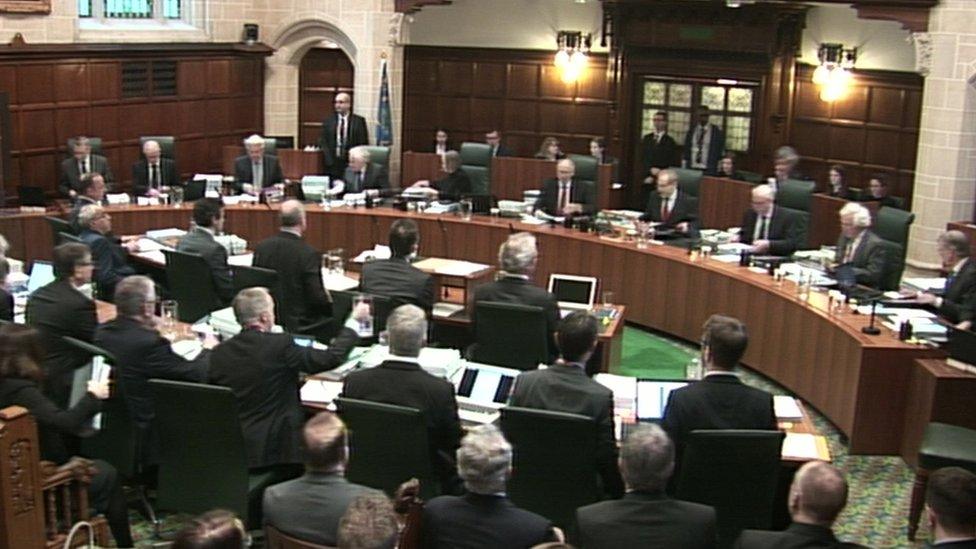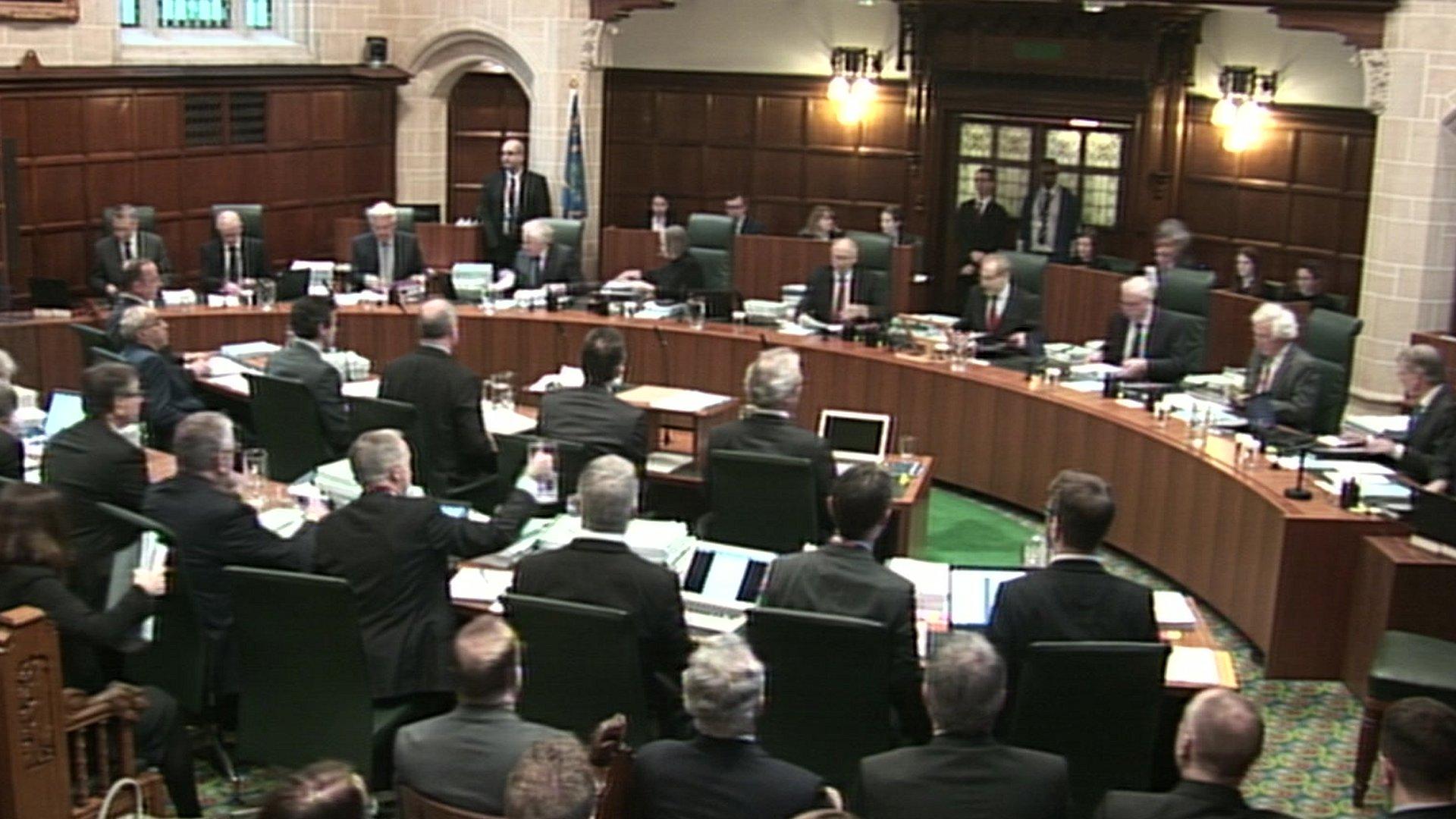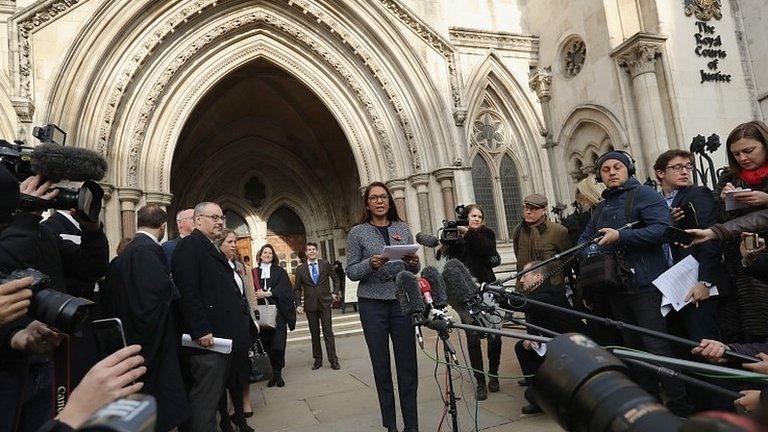Debating dualism: the Article 50 court case
- Published

The Supreme Court was treated to a debate on dualism
An intriguing opening day at the UK Supreme Court as their lordships ponder whether Parliament must have a role prior to the triggering of Britain's intended departure from the European Union.
You will recall, perhaps, that the High Court said: yes, it should. The UK Government takes the view that, as it concerns an international treaty, it is rightly a matter to be determined in the first instance by the UK government, acting under Royal prerogative.
There was much talk in the Supreme Court today of "dualism". James Eadie QC, for the UKG, said this effectively defined Parliament's role in such matters.
It was for the UK government to negotiate, sustain and, if so mandated or decided, to abandon international treaties, such as relations with the EU. It was for Parliament at Westminster to legislate for the consequences of such a decision in respect of domestic law. Dualism.
Aha, said several of their lordships. Actually, they didn't because they prefer a drawn-out delivery, often accompanied by a faint ironic smile, as if sharing a precious drollery - but you get the concept.
Anyway, there were several questions on this topic for Mr Eadie. If dualism had been involved in Britain joining the predecessor to the EU, why was it not thought necessary at the point of departure?
Because, said Mr Eadie, it was once more a question of the division of responsibilities. Parliament had explicitly granted power over this topic to the people in the June referendum. But it was for the Government to resile from membership of the EU, acting upon that popular mandate. It would then be for Parliament to legislate for the domestic consequences.
Scottish sovereignty
The Supreme Court will deliberate for most of this week, with a ruling expected early in the New Year. There is, of course, a Scottish dimension.
The Lord Advocate will argue that any concept of Parliamentary consent must be extended to Holyrood, as well as Westminster. That is because many of the issues where sovereignty is shared with the EU are devolved to the Scottish Parliament.
If dualism is accepted, then it might be argued that it applies to Holyrood too in that the domestic consequences of international dealings within the EU fall to the Scottish Parliament to apply for Scotland, in devolved areas.
Of course, the same UKG argument would presumably kick in. That it is for the UK government to begin, maintain and end international treaties - and that it is then for the relevant domestic Parliament to respond.

James Wolffe QC is to put forward arguments for the Scottish government at the Supreme Court
The hearing at the Supreme Court has stirred quite remarkable passion. It is, however, possible to envisage a scenario whereby it is seen - in the much longer term - as an adjunct, as an interim procedure.
Neither side at the Supreme Court - neither the appellant UKG nor the original petitioner Gina Miller - argues that the question is one of whether Brexit should happen. Both sides accept that the people have spoken.
The issue, they say, is one of how to proceed. It is conceivable, then, that Brexit will be triggered, one way or another, either with or without prior consent by Parliament(s), and that the issue will once more become the negotiated terms of Brexit.
Constitutional crisis
On which point, Alex Salmond argued at the weekend that a requirement for Holyrood consent might offer an opportunity to extract concessions in Scotland's interest. He characterised this as making a gain from a constitutional crisis.
Maybe so - although presumably that would depend on the extent to which the process is held up and the willingness of the UK Government and Parliament simply to ignore the absence of consent from Holyrood.
Then we have the emerging Scottish Conservative position, with Ruth Davidson arguing in a speech in London tonight that there should be an end to hostilities, that the object should be to forge a future for the UK outside the EU but inside the tent of global collaboration.
Ms Davidson's critics say it is a bit rich to be calling for an easing of tension in a situation created, initially, by the former Tory Prime Minister David Cameron.
Further, the First Minister Nicola Sturgeon accuses Ms Davidson of sidelining Scotland's interests, for example via the single market, in pursuit of a UK deal and Tory unity.
In summary, a fascinating day in the Supreme Court. Genuinely intriguing. But the EU referendum had its genesis in politics, in qualms within the Tories over UKIP. Britain's exodus from the EU will similarly involve political bargaining.
- Published5 December 2016

- Published25 November 2016

- Published3 November 2016
